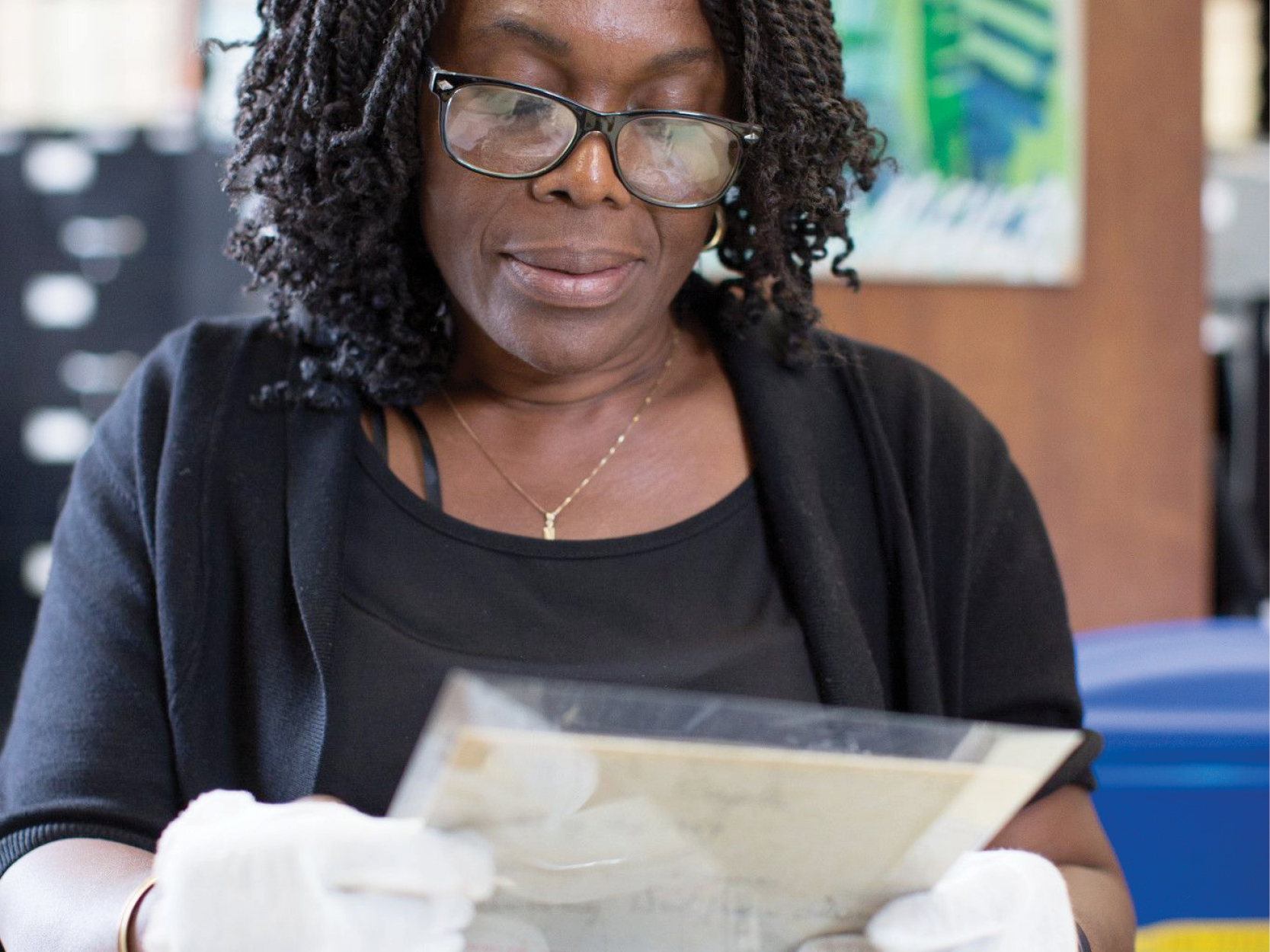Walt Whitman is quite literally one of Brooklyn's most celebrated (former) residents. We continually name buildings to honor him, including a middle school, a library branch, and a housing project, along with commemorating him annually with marathon readings of his epic poem, Leaves of Grass. Some suggest we take the adoration even further and rechristen our new NBA basketball team in homage to this pioneer of free verse. That seems unlikely to happen, but just as unlikely, perhaps, was the tribute mounted by Brooklyn College for the centennial of the publication of Leaves of Grass in 1955 -- a stage production of the original musical, I, Walt Whitman.
That's him, Walt Whitman, on the far left, shaking hands with a Brooklyn College president Dr. Harry D. Gideonse on opening night, January 14, 1955.
The play, written by Brooklyn College English professor Randolph Goodman, was commissioned as part of borough-wide festivities honoring Brooklyn's laureate. Brooklyn College built a new 2,500-seat auditorium, appropriately dubbed the Walt Whitman Theater, and the opening of the play would serve as an appropriate dedication of the space. The theater still stands today and still hosts musical and theatrical events as part of the Brooklyn Center for the Performing Arts. In the days leading up to the premiere of the Brooklyn-centric play, the Eagle visited the cast members in their final preparations.

Cast members at rehearsal, dwarfed by the enormous new theater.
The play follows Whitman throughout his life, starting with a scene from his youth, depicting the death of a younger brother and its effect on the Whitman family. This Eagle shot of "backstage banter" shows Andy Brandstone, who played Whitman as a boy.
From a brief overview of Whitman's youth, the play goes on to dramatize Whitman's years as a newspaperman, including a scene where Whitman meets Edgar Allan Poe (then editor of the Broadway Journal) and unsuccessfully pitches an idea for an article on East River ferries. The scene depicting Whitman's time at the Brooklyn Daily Eagle provides meatier dramatic fare, giving the audience a showdown between Whitman and the Eagle's founder, Isaac Van Anden. Although both men were professed Democrats, Van Anden sided with the more conservative branch of the party, which opposed interference in the South's slave-trading ways. Our brash hero Whitman defied the wishes of his boss and insisted on publishing editorials that called for abolishing slavery, which led Van Anden to issue an ultimatum.
"VAN ANDEN: [Shouts] Well, I'm going to ask you to make a more difficult choice. If you want to hold on to your principles, you will have to give up your job."
WHITMAN: [After a pause, during which the two men look fixedly at each other] Then . . . please accept my resignation . . .
VAN ANDEN: [Quietly] I'm sorry, Walt. You are a good editor . . . but you'd probably make a better poet . . . [He laughs weakly]
WHITMAN: [Wryly] It's a sad day for poetry if it has become the graveyard for honest politicians! [Brightly, but with an edge] Still, I can always dedicate my first book of verses to Isaac Van Anden, who fired me . . . with inspiration!"
 This Eagle photo of a rehearsal of Whitman and Van Anden's tumultuous scene doesn't quite convey the tension inherent in the script.
This Eagle photo of a rehearsal of Whitman and Van Anden's tumultuous scene doesn't quite convey the tension inherent in the script.
Whitman's interest in phrenology is incongruously highlighted in the play with a dramatization of Whitman's 1849 consultation with the phrenologist Lorenzo Fowler. Lorenzo and his brother, Orson, were early practictioners of the quasi-science that involved measuring and feeling the shape of the skull to determine a person's character. They were also publishers, and they not only promoted Leaves of Grass in their American Phrenological Journal, they also published the expanded second edition of the work. In Goodman's play, Lorenzo compliments Whitman on the self-esteem that is apparent in his cranial terrain and advises him to find himself a wife who can cook, to satisfy the "alimentiveness", or love of food and drink, that is evidenced both by Whitman's skull shape and the size of his belly.

Sprinkled throughout the play are appearances by a chorus, above, which sings verses from Whitman's own pen that comment on the play's action.
Although we can glean much from the play's script and backstage photos, it's still difficult to get an idea of how I, Walt Whitman played out in front of a live audience. For all it's pre-show hype, the Eagle never published a review of the play, which only ran for one weekend. I haven't been able to track down an existing copy of the play's musical score, so we can't even know the melodies to which Whitman's words were sung. Perhaps a revival of the play is in order? With new music, new choreography, acrobatics, fireworks, underwater sequences, the whole nine yards? Perhaps not. Whitman's body of work speaks for itself without the bells and whistles.
Unless you made it into a movie, a big summer family-friendly blockbuster in 3D, with Whitman himself portrayed as a plucky CGI blade of grass (voiced by George Clooney, of course) who inspires all the millions of other blades of grass with his fiery prose. Then you might be on to something...
This blog post reflects the opinions of the author and does not necessarily represent the views of Brooklyn Public Library.
Post a Comment
While BPL encourages an open forum, posts and comments are moderated by library staff. BPL reserves the right, within its sole discretion, not to post and to remove submissions or comments that are unlawful or violate this policy. While comments will not be edited by BPL personnel, a comment may be deleted if it violates our comment policy.
eNews Signup
Get the latest updates from BPL and be the first to know about new programs, author talks, exciting events and opportunities to support your local library.









